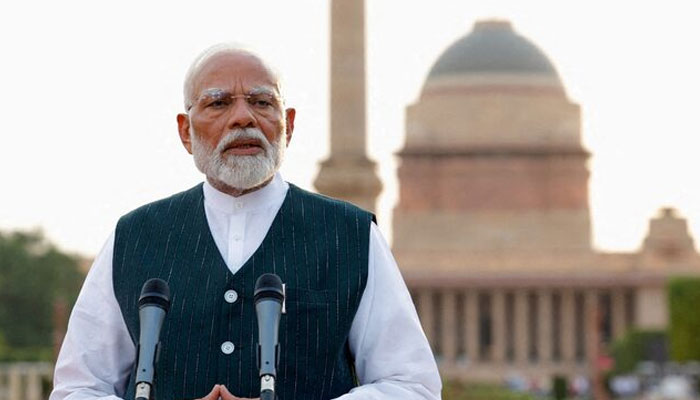Covert killings
Report says RAW meticulously pursued assassination campaign, killing at least six people deep within Pakistan
Recent investigative revelations by The Washington Post have exposed a disturbing reality: India’s intelligence agency, the Research and Analysis Wing (RAW), has orchestrated a series of targeted assassinations in Pakistan. According to the report, since 2021, RAW has meticulously pursued an assassination campaign, killing at least six individuals deep within Pakistan. These covert operations, allegedly directed by Indian Prime Minister Narendra Modi, have involved complex networks of intermediaries, informal banking channels, and siloed operational teams, all designed to maintain plausible deniability. This alarming report corroborates findings from The Guardian last year, which detailed nearly 20 killings in Pakistan since 2020, attributed to unknown gunmen. India’s transgressions are not confined to Pakistan. In September 2023, Canadian Prime Minister Justin Trudeau publicly accused India of involvement in the murder of Sikh activist Hardeep Singh Nijjar, citing ‘credible allegations’ of Indian state agents’ involvement. This was followed by US revelations in November 2023, detailing an Indian government official’s role in a failed assassination attempt on a Sikh separatist. The US Justice Department even charged an Indian government employee with murder-for-hire and money laundering related to this plot. Meanwhile, the mysterious death of Sikh separatist leader Avtar Singh Khanda in the UK has also been linked to Indian state foul play, according to his family.
By targeting dissidents and perceived ‘enemies’ across international borders, India has blatantly disregarded international norms and laws. These acts are not only a grave violation of sovereignty but also a stark indictment of India’s credibility as a responsible global actor. The evidence now emerging from Western media and governments underscores what Pakistan has long warned: India’s reckless and destabilising actions pose a threat not only to its neighbours but also to global security. Despite Pakistan’s repeated warnings, the international community has turned a blind eye, prioritising geopolitical alliances over accountability. India’s role as a counterweight to China in the region has seemingly insulated it from criticism. However, these revelations demand a reassessment. If the West continues to shield India to maintain its anti-China strategy, it exposes the hollowness of international law and the principles of sovereignty.
The time has come for the global community to act decisively. India’s state-sponsored terrorism must be condemned unequivocally, and it must be held accountable for its actions. The evidence is undeniable: India’s covert assassinations in Pakistan, Canada, and the US illustrate a dangerous disregard for international norms and an alarming willingness to export its authoritarian tactics abroad. Failure to address these actions will undermine rule of law and global stability. Pakistan has consistently called for international scrutiny of India’s actions. With corroborating reports from credible Western sources, the world must acknowledge India’s transgressions. The international community must demand transparency, accountability, and adherence to international law. Anything less would be a betrayal of the principles that underpin global order and justice.
-
 Andrew, Sarah Ferguson Refuse King Charles Request: 'Raising Eyebrows Inside Palace'
Andrew, Sarah Ferguson Refuse King Charles Request: 'Raising Eyebrows Inside Palace' -
 Adam Sandler Reveals How Tom Cruise Introduced Him To Paul Thomas Anderson
Adam Sandler Reveals How Tom Cruise Introduced Him To Paul Thomas Anderson -
 Washington Post CEO William Lewis Resigns After Sweeping Layoffs
Washington Post CEO William Lewis Resigns After Sweeping Layoffs -
 North Korea To Hold 9th Workers’ Party Congress In Late February
North Korea To Hold 9th Workers’ Party Congress In Late February -
 All You Need To Know Guide To Rosacea
All You Need To Know Guide To Rosacea -
 Princess Diana's Brother 'handed Over' Althorp House To Marion And Her Family
Princess Diana's Brother 'handed Over' Althorp House To Marion And Her Family -
 Trump Mobile T1 Phone Resurfaces With New Specs, Higher Price
Trump Mobile T1 Phone Resurfaces With New Specs, Higher Price -
 Factory Explosion In North China Leaves Eight Dead
Factory Explosion In North China Leaves Eight Dead -
 Blac Chyna Opens Up About Her Kids: ‘Disturb Their Inner Child'
Blac Chyna Opens Up About Her Kids: ‘Disturb Their Inner Child' -
 Winter Olympics 2026: Milan Protestors Rally Against The Games As Environmentally, Economically ‘unsustainable’
Winter Olympics 2026: Milan Protestors Rally Against The Games As Environmentally, Economically ‘unsustainable’ -
 How Long Is The Super Bowl? Average Game Time And Halftime Show Explained
How Long Is The Super Bowl? Average Game Time And Halftime Show Explained -
 Natasha Bure Makes Stunning Confession About Her Marriage To Bradley Steven Perry
Natasha Bure Makes Stunning Confession About Her Marriage To Bradley Steven Perry -
 ChatGPT Caricature Prompts Are Going Viral. Here’s List You Must Try
ChatGPT Caricature Prompts Are Going Viral. Here’s List You Must Try -
 James Pearce Jr. Arrested In Florida After Alleged Domestic Dispute, Falcons Respond
James Pearce Jr. Arrested In Florida After Alleged Domestic Dispute, Falcons Respond -
 Cavaliers Vs Kings: James Harden Shines Late In Cleveland Debut Win
Cavaliers Vs Kings: James Harden Shines Late In Cleveland Debut Win -
 2026 Winter Olympics Snowboarding: Su Yiming Wins Bronze And Completes Medal Set
2026 Winter Olympics Snowboarding: Su Yiming Wins Bronze And Completes Medal Set




